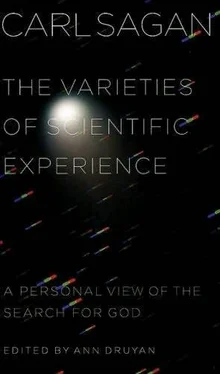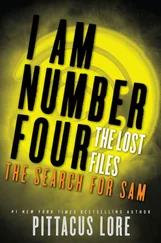All these explanations are not mutually consistent, but they show a remarkable inventiveness and a striking unwillingness to change a set of beliefs in the face of contradictory evidence. Eventually most of the adherents drifted away from the movement, but even those who left first had repeatedly shown heroic fidelity in the face of what they call "disconfirmation," to say nothing of external skepticism. It's clear that mutual support within the belief system was central to the success, however short-lived, of the faith.
There was no charismatic leader here. No ambitious scoundrel. It was automatic writing and ordinary people. Indeed, the group cast about looking for guidance. They thought that spacemen from Clarion must be around them in the most unlikely contexts. For example, there were a bunch of leather-jacketed, motorcycle-riding young men who had come to scoff, whom they immediately took to be the angels from Clarion. And likewise the members of the social-science research team, who had infiltrated the movement trying to understand how religious movements get started, were also taken as angels from Clarion. This posed all sorts of challenges to the proper detachment of scientist from subject.
Most of these people had previously been involved in other borderline religions or pseudoscientific groups, including UFO clubs, spiritualists, Dianetics, which has since transmogrified into something called Scientology, and so on. But it is the very ordinariness of this group that I believe gives some real insights into the origins of religion. Let me quote the concluding sentences by Festinger et al.:
They were unskilled proselytizers. It is interesting to speculate, however, on what they might have made of their opportunities had they been more effective apostles. For about a week they were headline news throughout the nation. Their ideas were not without popular appeal and they received hundreds of visitors, telephone calls and letters from seriously interested citizens as well as offers of money which they invariably refused. Events conspired to offer them a truly magnificent opportunity to grow in numbers. Had they been more effective, disconfir-mation might have portended the beginning and not the end.
Suppose they'd had a charismatic leader. Or suppose that by chance there had been a spectacular UFO sighting at the time of the predicted inundation, for example, an Air Force test of a new kind of aircraft. Or suppose that the message that came from Clarion was not just that there was going to be a flood but something powerful, something moving, something that spoke to an oppressed minority in the United States or elsewhere. Then I think we can see the possibility that the Clarion religion would have grown into something much larger. If we look at recent religions-and let me restrict myself to those that have more than a million adherents-we find, for example, one that confidently predicted that the world would end in 1914. Unambiguous. And when the world did not end in 1914 (as far as one can tell it has not), they did not argue that, oh, they made a small mistake in arithmetic, it was actually 2014, hope no one was inconvenienced. They did not say that, well, the world would have ended, but they were sufficiently faithful that God intervened. No. They said, and it is still the major tenet of their faith, that the world did end in 1914 and we simply haven't noticed yet. This is a religion with millions of adherents, currently in the United States.
Or there is a religion that says that all diseases are psychogenic, that there is no such thing as a microorganism producing disease. There is no such thing as a cellular malfunction producing a disease, that the only thing that produces disease is not thinking right, not having adequate faith. And I need not remind you that there is a significant body of medical evidence to the contrary.
There is a religion that believes that in the nineteenth century a set of golden tablets was prepared by an angel and dug up by a divinely inspired human being. And the tablets were written in ancient Egyptian hieroglyphics and had on them a hitherto-unknown set of books like those in the Old Testament. And, unfortunately, the tablets are not available for any scrutiny these days, and in addition there is powerful evidence of conscious fraud at the time that the religion was founded, which led, last week, to two people being killed in the state of Utah, having to do with some early letters from the founders of the religion that were inconsistent with doctrine.
Or there is a religion that believes that if you only have enough faith, you can levitate. I mean, that you can bodily float off the ground and propel yourself. It has many practical applications, if only it were true. These are perfectly typical tenets or aspects of modern religions.
And if that is true, what about ancient religions? After all, there is a much greater distance in time between us and those earlier religions. And that means that there are much larger opportunities for fraud and for changing the disquieting details. I remind you that rewriting history is done all the time. To give an example-there are so many-one of the leaders of the Russian Revolution was a man named Lev Davidovich Bronstein, also known as Leon Trotsky. He founded the Red Army, he established the modern Soviet railroad system, he was the founder and first editor of Pravda, he played a leading role in both the 1905 and the 1917 revolutions, but he does not exist in the Soviet Union. He's not there. You cannot find anything about him. There is no picture of him. In a two-volume Soviet history of the world, he appears once, as having inappropriate agricultural views. Otherwise unmentioned. They have simply written him out of the history of their own revolution, in which he played an absolutely central role, second perhaps only to that of Lenin. So now imagine that a religion is founded not just a few decades ago but a few centuries or a few thousand years ago, in which the received wisdom passes through a small group-a small priesthood. Think of the opportunities for changing disquieting facts in the interim. David Hume says,
The many instances of forged miracles and prophecies and supernatural events, which in all ages have either been detected by contrary evidence or which detect themselves by their absurdity, prove sufficiently the strong propensity of mankind to the extraordinary and marvelous and ought reasonably to beget a suspicion against all relations of this kind. It is strange, a judicious reader is apt to say, that such prodigious events never happen in our day, but it is nothing strange that men should lie in all ages.
And then on the point that I was just making, he says,
In the infancy of new religions the wise and learned commonly esteem the matter too inconsiderable to deserve their attention or regard. And then when afterwards they would willingly detect the cheat in order to undeceive the deluded multitudes, the season is now past and the records and witnesses which might clear up the matter have perished beyond recovery.
Well, it seems to me that there is only one conceivable approach to these matters. If we have such an emotional stake in the answers, if we want badly to believe, and if it is important to know the truth, then nothing other than a committed, skeptical scrutiny is required. It is not very different from buying a used car. When you buy a used car, it is insufficient to remember, that you badly need a car. After all, it has to work. It is insufficient to say that the used-car salesman is a friendly fellow. What you generally do is you kick the tires, you look at the odometer, you open up the hood. If you do not feel yourself expert in automobile engines, you bring a friend who is. And you do this for something as unimportant as an automobile. But on issues of the transcendent, of ethics and morals, of the origin of the world, of the nature of human beings, on those issues should we not insist upon at least equally skeptical scrutiny?
Читать дальше










